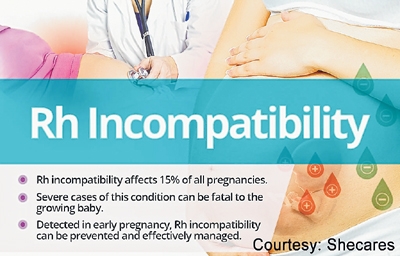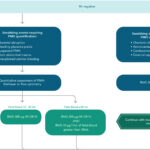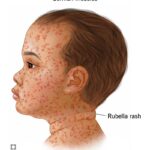Rhesus isoimmunization, or Rh sensitization, occurs when an Rh-negative mother is exposed to Rh-positive fetal red blood cells (RBCs), triggering an immune response that results in the production of anti-D antibodies. These antibodies can cross the placenta in subsequent pregnancies, leading to hemolytic disease of the fetus and newborn (HDFN)—a severe and sometimes fatal condition.
Preventing Rh sensitization is a cornerstone of modern obstetric care, with established protocols involving early Rh typing, timely administration of anti-D immunoglobulin (RhIg), and vigilant monitoring of at-risk pregnancies.

Rh Factor and Sensitization Risk: The Immunohematologic Basis
The Rh factor is a protein present on the surface of red blood cells. Individuals who possess this protein are Rh-positive, while those who lack it are Rh-negative. Problems arise when an Rh-negative mother carries an Rh-positive fetus.
Fetomaternal hemorrhage (FMH)—even in small volumes—allows fetal Rh-positive RBCs to enter the maternal circulation. The mother’s immune system may recognize these as foreign and initiate the production of anti-D antibodies. Subsequent exposure during future pregnancies can result in rapid antibody-mediated destruction of fetal red cells.
Critical Timing of Sensitization Events in Pregnancy
Sensitization can occur during several obstetric events:
- Spontaneous miscarriage or abortion
- Ectopic or molar pregnancy
- Chorionic villus sampling (CVS)
- Amniocentesis
- Trauma to the abdomen
- Manual removal of placenta
- Delivery of an Rh-positive baby
Each of these events poses a risk of FMH and requires a targeted prevention strategy to avoid long-term immunologic complications.
Universal Antenatal Rh Typing and Risk Stratification
Antenatal care begins with routine Rh blood group typing and antibody screening during the first prenatal visit. This allows clinicians to:
- Identify Rh-negative women early
- Detect any pre-existing anti-D antibodies
- Monitor maternal antibody titers if sensitization has occurred
Women found to be Rh-negative with no detectable anti-D antibodies are eligible for prophylactic RhIg administration.
Anti-D Immunoglobulin: The Cornerstone of Rh Isoimmunization Prevention
Mechanism of Action
Anti-D immunoglobulin is a concentrated preparation of IgG antibodies that target RhD-positive RBCs. Administered intramuscularly, RhIg binds any fetal Rh-positive cells in maternal circulation, preventing the maternal immune system from recognizing and reacting to them.
Prophylaxis Schedule
- Antenatal prophylaxis: 300 µg RhIg at 28 weeks’ gestation for all non-sensitized Rh-negative women
- Postnatal prophylaxis: 300 µg RhIg within 72 hours after delivery of an Rh-positive newborn
- Additional dosing: 50–120 µg RhIg after any sensitizing event in the first trimester; 300 µg for later gestation events
RhIg prophylaxis is highly effective, reducing the rate of sensitization from 13–16% to less than 1%.
Special Considerations in First Trimester and Early Pregnancy
Even minimal FMH—less than 0.1 mL—can sensitize the mother. Therefore, anti-D prophylaxis is indicated for Rh-negative women in the following early pregnancy events:
- Surgical abortion or curettage
- Medical abortion using misoprostol/mifepristone
- Incomplete or threatened miscarriage
- Ectopic pregnancy
- Hydatidiform mole
Early intervention with 50 µg of RhIg is adequate for FMH involving less than 4 mL of fetal blood.
Postnatal Management and Cord Blood Testing
At delivery, the following steps are essential:
- Determine the newborn’s Rh status via cord blood sampling.
- If the neonate is Rh-positive, the mother receives 300 µg RhIg IM within 72 hours.
- Perform a Kleihauer-Betke test or flow cytometry if excessive FMH is suspected to determine the appropriate RhIg dose.
Managing Sensitized Pregnancies: Monitoring and Interventions
Once sensitization has occurred, anti-D prophylaxis is no longer effective, and pregnancy management shifts toward fetal monitoring:
- Serial anti-D antibody titers to assess maternal alloimmunization
- Ultrasound and middle cerebral artery (MCA) Doppler to detect fetal anemia
- Intrauterine transfusions (IUTs) if fetal anemia is confirmed
- Early delivery if fetal distress is imminent and gestational age is viable
Close maternal-fetal medicine supervision is required for such high-risk pregnancies.
Institutional Guidelines and International Recommendations
ACOG Guidelines
- Strongly recommend RhIg at 28 weeks and postnatally for Rh-negative women
- Suggest RhIg for all early pregnancy loss events
RCOG Guidelines
- Recommend anti-D for any sensitizing events beyond 12 weeks
- Recommend RhIg in cases of vaginal bleeding before 12 weeks if associated with pain or recurrent miscarriage
The prevention of Rhesus isoimmunization remains a critical intervention in modern obstetric care. Timely administration of anti-D immunoglobulin, combined with appropriate screening and surveillance, ensures that Rh-negative mothers are protected against alloimmunization and its devastating consequences. Universal adherence to evidence-based protocols reduces the incidence of HDFN and ensures better neonatal outcomes worldwide.

